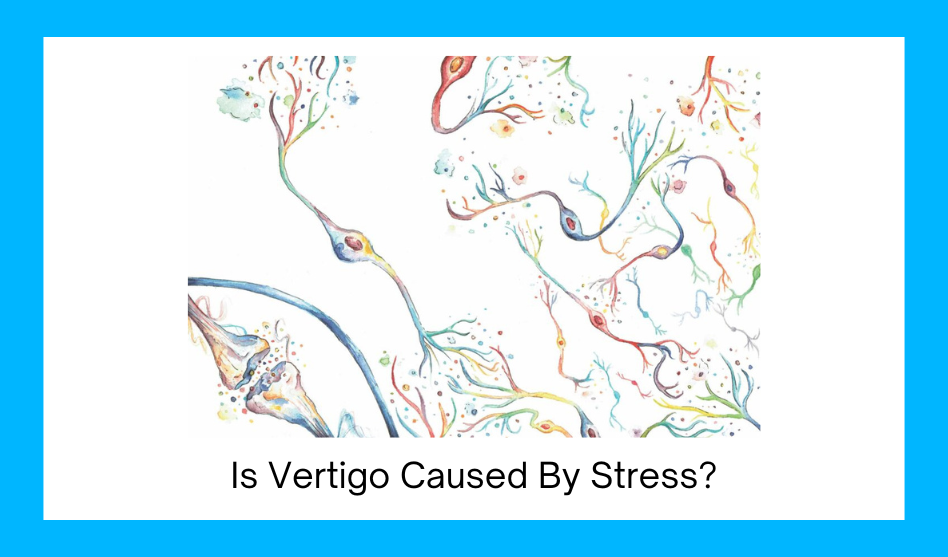Is vertigo caused by stress? There are so many different causes to vertigo that yes, of course, stress is one of them. And it’s quite often in vestibular clinic that will say people who may have moved house, changed countries, gone through a job loss or divorce, and suddenly, they have these vestibular conditions, vertigo, dizziness that comes out of nowhere, but it has certainly aligned with a period of their life in deep stress, myself included. When I experienced vertigo, I had just gone through a huge trauma: My brother had broken his neck and become a quadriplegic, and I’d started full-time work as a vestibular audiologist.
 I was working 9 to 5, as well as caring for my brother, and I was really depleted, exhausted, and emotionally strung out. It was a very sad time, and I don’t think it’s ever linear. So I wouldn’t ever say, “Oh, it’s because of stress I’ve got this.” And I wouldn’t blame the stress. It’s more like, “Okay, well, if stress is a factor and if stress is impacting my vertigo or dizziness symptoms, what can I do about it? How can I prevent stress? How can I support and reassure myself?” And all of these questions can be answered through a self-study process. It’s probably not going to be going to get craniosacral therapy or acupuncture. There’ll be very many skills and tools you need to help address your vertigo and any of the stress related to the vertigo.
I was working 9 to 5, as well as caring for my brother, and I was really depleted, exhausted, and emotionally strung out. It was a very sad time, and I don’t think it’s ever linear. So I wouldn’t ever say, “Oh, it’s because of stress I’ve got this.” And I wouldn’t blame the stress. It’s more like, “Okay, well, if stress is a factor and if stress is impacting my vertigo or dizziness symptoms, what can I do about it? How can I prevent stress? How can I support and reassure myself?” And all of these questions can be answered through a self-study process. It’s probably not going to be going to get craniosacral therapy or acupuncture. There’ll be very many skills and tools you need to help address your vertigo and any of the stress related to the vertigo.
Because the other piece in the puzzle is, while for some people stress seems to be the actual trigger, for others, stress is not the trigger. However, stress is the result. So they get the vertigo for whatever reason as a non-stressful related incident, the vertigo and dizziness begins and then vertigo and dizziness starts to trigger the stress. And then you can end up in this kind of disease—stress, anxiety, disease cycle. So what do you do about it? You learn how to treat this at home yourself. And the Rock Steady book explains why anxiety and vertigo and dizziness and stress are so interrelated and what we can do about that physically, mentally, emotionally, and spiritually to resolve it. It’s a process of self-study and insight. You learn to become the expert in you and you learn how to resolve any physical, mental, emotional, or spiritual conundrums that you find within yourself. And it’s a really beautiful process.
And I think so many people are used to asking somebody else to fix them that it can come as a real shock when they realize, “Oh, what do you mean I have to figure this out myself?” As a health professional, I don’t know you, I don’t know what you feel, I don’t know what you want to feel. And let’s say you do want to feel steady, peaceful, and calm: I don’t know how to trigger those neural pathways in you, which are the neural pathways you’re going to be building in order to heal and overcome your stress-related vertigo. And so you’re the expert in how you feel peaceful, you’re the expert in how you feel calm, you’re the expert in how you generate steadiness signals.
The Rock Steady book and the Rock Steady program offer a lot of supportive resources, ideas, skills, tools that you can trial and play around with. But at the end of the day, you decide what works for you in any given moment. And you’ll be designing your own at-home neuroplasticity practice to override your vertigo and dizziness and to completely support and resolve chronic stress patterns so that you can come back to a relaxed, open way of life with steadiness, calm and peace.

